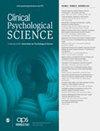Association Between Depression Symptoms and Emotional-Communication Dynamics
IF 4.1
2区 医学
Q1 PSYCHIATRY
引用次数: 0
Abstract
Communicating emotional experiences effectively is critical for adaptive functioning and personal and interpersonal well-being. Here, we investigated whether variability in depression symptoms undermines people’s ability to express their emotions to others (“emotional expressive accuracy”) and how those communication dynamics influence other’s impressions. In Phase 1, 49 “targets” were videotaped describing significant autobiographical events; they then watched their videos and continuously rated how positive/negative they were feeling throughout the narrative. In Phase 2, 171 “perceivers” watched subsets of videos from targets and similarly rated each target’s affect. Results from 1,645 unique target–perceiver observations indicate a link between target’s depressive symptoms and impaired emotional expressive accuracy for positive events, B = −0.002, t(1,501) = −3.152, p = .002. Likewise, more depressive targets were rated less favorably by perceivers, again when sharing positive events, B = −0.012, t(1,511) = −10.145, p < .001. Given the beneficial effects of “capitalization”—sharing positive experiences with others—these findings may illustrate one link between depressive symptoms and impoverished relationships.抑郁症状与情绪沟通动态的关系
有效地沟通情感体验对适应功能和个人及人际健康至关重要。在这里,我们调查了抑郁症状的可变性是否会破坏人们向他人表达情绪的能力(“情绪表达准确性”),以及这些交流动态如何影响他人的印象。在第一阶段,对49个“目标”进行录像,描述重要的自传事件;然后他们观看他们的视频,并不断评估他们在整个叙事过程中的积极/消极感受。在第二阶段,171名“感知者”观看了目标的视频子集,并对每个目标的影响进行了类似的评估。来自1,645个独特的目标感知者观察的结果表明,目标抑郁症状与对积极事件的情绪表达准确性受损之间存在联系,B = - 0.002, t(1,501) = - 3.152, p = .002。同样,在分享积极事件时,感知者对更抑郁的目标的评价也更低,B = - 0.012, t(1,511) = - 10.145, p <措施。考虑到“资本化”——与他人分享积极的经历——的有益影响,这些发现可能说明了抑郁症状与贫困人际关系之间的一种联系。
本文章由计算机程序翻译,如有差异,请以英文原文为准。
求助全文
约1分钟内获得全文
求助全文
来源期刊

Clinical Psychological Science
Psychology-Clinical Psychology
CiteScore
9.70
自引率
2.10%
发文量
35
期刊介绍:
The Association for Psychological Science’s journal, Clinical Psychological Science, emerges from this confluence to provide readers with the best, most innovative research in clinical psychological science, giving researchers of all stripes a home for their work and a place in which to communicate with a broad audience of both clinical and other scientists.
 求助内容:
求助内容: 应助结果提醒方式:
应助结果提醒方式:


